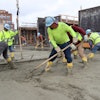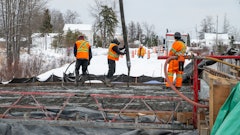
One of the common stories in concrete construction that remains today is that of the son or daughter who began working with his/her dad on construction jobs during the summers. During those teenage years, many will often claim they never anticipated it would become a lucrative career, one that would see them become leaders of their own crews, sometimes not long after becoming full-time employees.
This type of success story remains common for someone in the construction industry in the post-Millennial generation, fondly referred to as the “21 & Under Crews,” and is part of the latest excitement at Lee’s Summit, Mo.-based ABI Corporation. It is significant, especially as the industry faces an aging workforce, a shortage of qualified workers and image issues.
However, by providing good on-the-job training, appealing to what motivates the younger generation, and educating prospective workers about the many opportunities available in the construction industry, finding qualified workers may not be so difficult in the future.
“When I started at ABI, my friends saw me working hard and doing well and they all wanted jobs,” Engel Jr. says. A handful of Engel Jr.’s friends applied at the company and now work as part of his crew with plans to make their job a career.
One of Engel Jr.’s friends – now on his crew and part of the 21 & Under age group – had been working at a fast food restaurant when he realized that he was able to make the same amount of money working 40 hours a week in construction as working 80 hours a week in fast food. It was then that he decided to pursue a job in the construction industry and make it a career.
Mike Doherty, a crew leader/foreman for ABI Corporation, started his career in the construction industry at a young age when he realized it would pave the way for a profession with great opportunities.
Doherty, now 22 years old, realized after one semester of college that it wasn’t a good fit for him. “College isn’t for everyone,” he says. “There are a lot of people who have a good head on their shoulders and can succeed without a four-year degree. Find something that you are good at or like to do and work really hard. If you do that, have common sense and intelligence, you will get noticed pretty quickly.”
Doherty recognized that he needed a job that allowed him to be physical. He says he also realized that the construction industry would provide a steady income and that skills and talents can sometimes pay almost as much – sometimes even more – than a job that requires a four-year degree. Good, on-the-job training such as Doherty received from experienced industry veteran Brandon Mitchell, who has now moved up to a superintendent position, and other seasoned crew members, sealed the deal on his career choice.
“You need to figure out what works for you,” Doherty says. “Whatever is going to make you go to work every day and make you enjoy your job is more valuable to me than what is going to make someone else happy. Give everything a chance until you find something you are passionate about and makes you want to go to work every day.”
Now, Doherty says his best recruiting tool for showing others what the industry has to offer is himself. His success and love for his job help dispel the mindset sometimes associated with the construction industry – that it is a "last resort option" and just a paycheck.
“I came in at the very bottom of the totem pole as a beginning laborer,” he says. “I worked as hard and learned as much as I could, and within a year and a half, they saw my potential and that I’d be around for a while. You can really make a job in this industry into a lifelong career. Don’t worry about the money. The money will come.”
Balancing Multi-generational Crews
Being a young foreman has its advantages but it doesn’t come without its obstacles, especially when leading a multigenerational crew. Doherty says the generation above him taught him “everything he knows,” and that “about half of his crew is 10 to 15 years older,” than him.
“They want younger guys in this industry – someone who can be around for a while so they can teach their trade to them,” Doherty says. “They want to train a new generation to come in and take over.”
However, this leadership position at a younger age also comes with paying your dues by starting out as a new laborer and putting your all into the job to really learn how the job is done – that is, done well and correctly.
“The older generation and more experienced members of my crew helped me figure out everything I didn’t master yet and how to get through tougher challenges,” Doherty says. “These people have been around the business for years and years and are valuable. There are times when I am teaching 20-year-olds and times I'm teaching people who have been here for a while. We all learn from each other."
Although there may be some animosity when a younger crew leader takes over, this is remedied by going on the job and proving to the more experienced crew members that you really paid attention while being trained and that you respect them and what they have taught.
“When you go out and prove to them that you know what you are doing, respect can be earned,” Doherty says. “That respect isn’t just given though. You have to earn it from people who have been doing this job since you were five years old and show that you can work just as long and hard as them and do the job right.”
Showing Success on Social Media
With their young leadership, Doherty and others at ABI have dispelled the often pre-conceived notion that the current generation new to the job force and those soon entering it don’t want to work hard – and they and their young crew members are doing so via social media with the “Under 21” Facebook group.
Ironically, they use the social media group as a way – almost a competition – to show just how hard they do work. Many of the “21 & Under” crew members are active on the “Foundation Contractors…the Wall Dogs,” a closed Facebook group with nearly 2,900 members, and use the group as a way to share successes and accomplishments.
Using a social media platform – something this age group identifies with and understands – has been effective in motivating the young crew members and leaders. It is providing a way to show accomplishments and share ideas to learn from each other.
“The crews all work hard then they post it to the Facebook page,” says Jeremy Engel Jr., a 21 & Under lead crew member. "They want to show what they have gotten done. It motivates them to show their work and use it as fuel. It’s kind of like a competition on who can work the hardest or set the biggest wall.”
It makes sense to combine Facebook and work, Engel Jr. points out, because all of the crew is familiar with Facebook and they all need to be at work every day. “Why not combine the two – work and Facebook – and make the best of it?” he says. “It’s a great way to show the accomplishments of everyone going to work and giving it their all.”
Doherty adds that it also provides a good opportunity to see what other companies in the industry in different states and throughout the country are doing on their job sites. “There are so many ideas that get thrown out there,” he says. "We can see what other people are doing."
Plus, a little healthy competition never hurts. “One of my biggest training tools is competition,” Doherty says. “Whenever we get to show something off and say we were able to get it done in this amount of time, I think it makes the guys feel good.”
Finding and Training Young Talent
Hiring and retaining talent continues to be part of an ongoing discussion between CFA members and within the CFA Hotline, a member-based Q&A email service. In addition, CFA maintains a company certification program with more than a decade of experience to certify foundation contractor firms in the residential cast-in-place industry. The program provides the industry with a common measurement of competency for concrete foundations and the companies that construct them.
ABI Corp. is certified through CFA’s program and has been using it to leverage its expertise and establish itself as part of a recognized network of residential foundation professionals. This is important when looking to hire and retain all levels of talent, especially a younger workforce that is looking to establish a career.
Recruiting and retaining young talent in the construction industry has become increasingly important with an aging workforce.
This means finding future employees and foreman and ensuring they are taught how to do a job correctly. It also means showing the younger generation that there are many opportunities in the business and identifying future leaders.
How do you recognize potential young talent?
“You look for someone with a light in their eyes and the drive to work,” says Dan Bromley, president/part owner of ABI Corporation and past president of the Concrete Foundations Association (CFA).
He takes note when he finds someone who is smart, has a good personality, gets along well with others, is hardworking and has a willingness to do all different types of training.
Bromley says it is important to communicate with promising members of this younger generation, to let them know if they have been pinpointed as future foremen or equipment operators and tell them the steps necessary to get there. If these future leaders are able to pass a drug screen and do not have any DUI/DWI history on their driver’s licenses, Bromley finds out what their goals are and how they view their future.
“As soon as we see someone younger with talent and the drive and intelligence to succeed, we work on getting them their commercial driver’s license (CDL),” he says. “When we need to replace someone, we want to be able to fill the position with someone we have already trained.”
Bromley points out that almost every person who has moved up in the company or has a supervisor role (with the exception of accounting) has started as a laborer. This is important to help them understand the business from the ground up. “If your driving record is clean and you work hard, you will move up,” he says. “Even if a position is not open, the company is big enough where there are always opportunities.”
Bromley shares the example of one young employee who had passed the written exam for his CDL but just wasn’t able to get down shifting the truck.
“We spent a week with him driving in a quarry to teach him how to do it properly,” he says. “You earn loyal workers when you spend time working with and training them, making sure they know how to do a job properly. It might not always work out, but it’s an investment. You have to try.”
ABI takes the same approach with training new employees and potential foremen time and time again, with management remembering what it was like just starting out and the importance of someone taking the time to teach them.
Many foremen don’t have the patience and don’t put the time in to teach the crews to complete their tasks the right way. At ABI, the focus is on teaching crews to do it right; we preach the importance of doing it correctly, not fast. Speed is a product that comes with experience and time. No expectations are made for new hires to be able to just come out, set forms and pour concrete on day one.
And though the younger generation has to earn the respect of the experienced workers, the team at ABI believes that respecting those learning goes a long way. Accessibility to and visibility of mentors and even, at times, father figures by those being trained is critical. “Give them respect, receive respect back” is a slogan that one perceives when listening to the stories told by these mentors. From respect grows confidence, loyalty and the performance that keeps the younger generation crews around.
It can be difficult to be patient when trying to teach or get a point across that may be second nature to an industry veteran, but it’s a key to success. Some of the main points the ABI crew leaders make are: 1.) Don’t yell at them and call them idiots. 2.) Give them the respect they deserve. 3.) You’ll get more guys to work for you if you treat them nicely than if you are a grumpy “S.O.G” (son of a gun).
Ultimately, the future depends on training the current young workforce and finding prospective industry leaders, and ABI’s training and management approach sets this standard. In fact, supervisors and their teams are often glad to be teaching the trade to a younger generation that they see as motivated and hardworking. Instead of voicing frustration with this new generation of possible labor force, they realize that if this generation doesn’t do it, we won’t have anywhere to live.
What final word of advice do they give? “These kids really are interested in what we are trying to teach them. When people say underage kids don’t want to work, they don’t know our group.”


















